Through six editions of The Mohawk Million, Steve and Cindy Stewart of Hunterton Farm in Kentucky have an enviable record in the $1 million event for two-year-old trotters. They’ve co-bred the winner three times, co-owned the winner twice, and seen the winner race out of their slot in three of the past four years. In total, they’ve been connected to five of the six winners, and in the one year that they didn’t win, the horse racing out of their slot still finished third. No wonder the couple are already looking forward to participating in the 2026 edition of the event. By Chris Lomon.
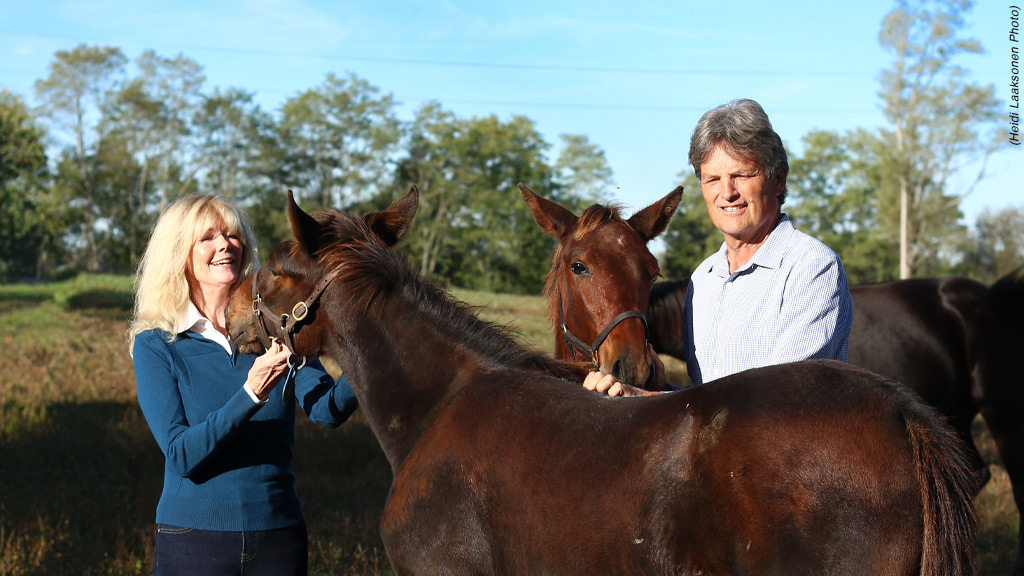
Hunterton Farm never dreamed of becoming a powerhouse in one of Standardbred racing’s most prestigious events. Yet that is precisely what they are.
It was five years ago, in 2020, when Steve and Cindy Stewart - the husband-and-wife team behind one of harness racing’s most successful and respected breeding operations - first heard of the unique trotting event known as The Mohawk Million.
The race was a bold new concept in the sport at the time: a $1 million trotting event for two-year-olds, where slots, not entries, were purchased in advance, and later kept, assigned or sold. The Stewarts, staunch supporters of the industry both on-and-off the track, welcomed the innovation.
“At the very outset, I thought it was an excellent idea,” said Steve, who along with Cindy, have bred a number of superstars, including three Hambletonian winners in Forbidden Trade, Trixton and Tactical Approach, U.S. Horse of the Year, Rock N Roll Heaven, Mission Brief, Tactical Landing, Rebuff, Allegiant, and Canadian Hall of Fame inductee Run the Table - to name just a few.
“I don’t have a problem with the format because to me, this sport is like a poker game anyway. When you play poker, you can play penny ante… you aren’t going to win very much. Or you can play nickel, dime, dollar, or more - and you get to decide what the stakes are when you invite people over to your house to play.
“We can all say that we don’t like stakes payments - and it’s fine if you don’t think that way - but it is a way to make the pot bigger. If you think you have a good hand early on, vis-a-vis a horse, you can pony-up and go get your next card, so to speak [purchase a slot in February]. You can also decide, if your horse is racing well [later on], to ante up then and do it that way.”
What Steve and Cindy didn’t expect, especially back in 2020, was to become synonymous with the race itself.
Six years later however, after six chapters of the race have been held, that is exactly the status Hunterton has gained.
“Every turn of the page, we have been very fortunate when it comes to The Mohawk Million,” said Steve. “It’s been remarkable. To say we are all over the Mohawk Million is a complete understatement.”
And then some.
In the beginning, simply having a name like Hunterton attached to the 2020 race was a big win for all those associated with the event.
Named after Steve’s middle name, Hunter, the farm has carved out a unique identity in the Standardbred world. Hunterton is the largest Standardbred breeding farm in the world that does not stand stallions, a model that allows the Stewarts and their team to focus solely on selecting the best stallion match for each mare.
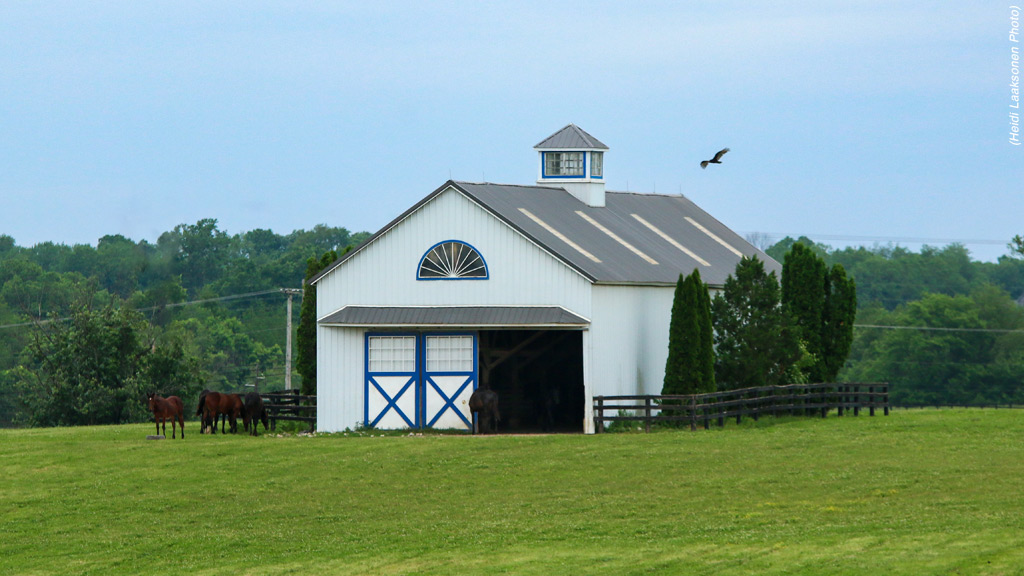
So, it was by no means a surprise to anyone in the industry that at least one horse connected to Hunterton would line up behind the gate for the first Mohawk Million. And Hunterton’s involvement in that inaugural edition, proved to be a sign of things to come.
That year, Venerate, a son of Love You out of Peaceful Kemp, bred by Hunterton (along with Black Creek Farm and Kemppi Stables), won the debut race with Andy Miller driving for his wife, trainer Julie Miller, racing in the slot owned by Brad Grant, Marvin Katz and their partners.
That race, with a purse of $1,333,334, was the richest Standardbred race contested in Canada since the 2012 Pepsi North America Cup.
One year later, it was the turn of Venerable - a filly who was also bred by Hunterton Farm (along with Black Creek Farm, Maumee River Stables and Martin Schmucker) - to take the spoils in North America’s richest race for freshman trotters.
“Those were very memorable wins, and to know that we bred the horses is a real source of pride,” Steve said. “Venerate had won [just six days earlier] on the Sunday. He had won the Kentucky Sires Stakes final at The Red Mile and was in good form. Julie Miller and the owners decided to ship him to Mohawk and race in The Million anyway - and they won it.
“The next year, Venerable had won the Peaceful Way [at Mohawk], and we thought it obviously would be great if she went into The Million and won it as well. There was a little bit of hesitation with the owner, David McDuffee, and the trainer, Nifty Norman, because she was a filly, but she was better than everyone else and won it as well.”
Both victories led to wider recognition for the trotters - and for the farm.
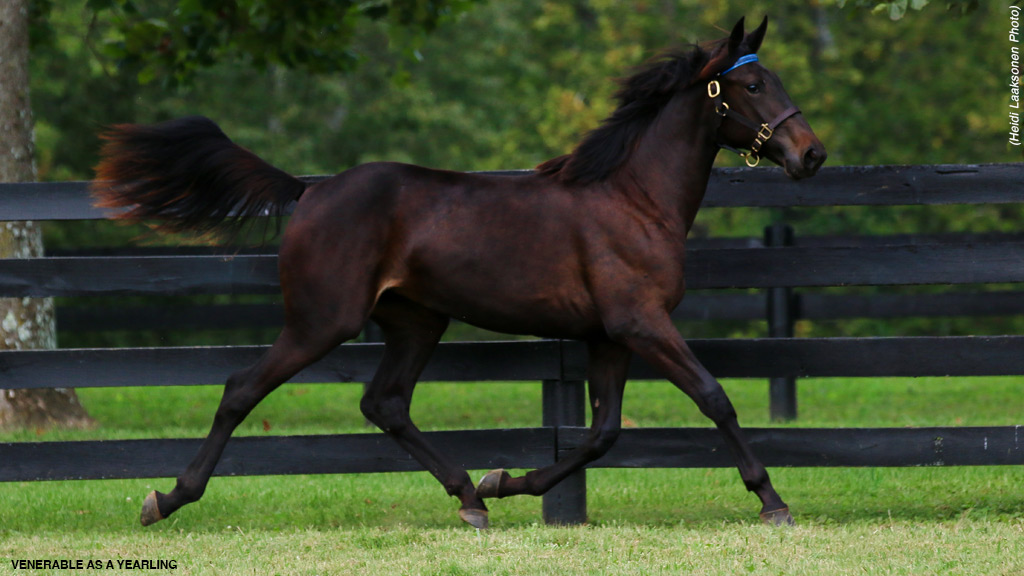
“If there was not a Mohawk Million, there’s a very good chance they would not have both been named two-year-olds of the year in their respective divisions,” stated Steve. “Venerable [a daughter of Walner - Jolene Jolene] beat the boys, and had that in her quiver, which likely gave her the edge in voting. Venerate, it was the same thing. When you have that crown, two-year-olds of the year, that’s a pretty big statement when it comes to selling their siblings.”
Those triumphs, on-and-off the racetrack, prompted Stewart to approach the third edition of the Mohawk Million from a different viewpoint.
An affinity for the race and helping to make sure it continued were top-of-mind for Hunterton.
“The third year, they were having a little bit of trouble filling slots,” said Steve. “That’s when we spoke to our partners about giving back to the industry. I have said many times, especially for races like this, that they are so important, because you need big events for people to believe they have a shot at getting their yearling purchases back.
“We were motivated by wanting to keep the race going. I talked to my partners with the idea of teaming up to buy a spot. A lot of the bigger outfits were basing their slot purchase on racing one of their own horses in it. Everybody at Mohawk was very kind and I think they were very happy that someone outside of that sphere, with us being breeders, was buying a spot to help keep the race going.
“I got a text from [now retired Mohawk Racing Secretary] Scott McKelvie, who congratulated us for breeding the first two winners and thanked us for being part of one of the slot owners who stepped up to help ensure the race would keep going. That was nice.”
Like the two previous years, in 2022, a total of nine slots were up for purchase at the cost of $100,000 (CAD) each. The tenth and final slot would go to the winner of the William Wellwood Memorial - in this case, Winners Bet.
“My thought process, which I was able to convince my partners with, was that we might end up making more money than anybody in the game [by investing in the race to help keep it alive]. We already owned the mothers of the first two winners, and both ended up as two-year-old champions. That’s why I felt that we should buy a spot in 2022.
“I explained about the payment process, so we pooled our money, the same way we do when we buy mares, and we bought a spot.”
For a time however, a Hunterton hat-trick in The Million would seem like a longshot hope at best. Going from breeder to slot owner was proving to be a different ballgame altogether.
“We went through the summer - we’re novices in The Million at this point - and we came to the realization that you couldn’t start talking to someone in July or August, because these are two-year-olds. Just because a horse looks good in July, doesn’t mean he or she is going to be ready to go in later September when the race goes.”
Just like Venerable’s head score in the 2021 Million, it was going to come down to the wire for Hunterton and partners.
“As time went on and we got closer and closer to the event, we got all the way to the week before, and we got talking amongst ourselves and realized we still didn’t have a horse for the race.
“It was easier for us than a lot of people though, because of the ability our group had to text someone like Marcus Melander, which is what we then did.”
The ownership group turned its attention to, and rested its hopes on, the availability of a bay son of Muscle Hill out of the Cantab Hall mare Fine Tuned Lady.
“On the Friday night, Oh Well had won the New Jersey Classic,” recalled Steve. “One of the guys in our group, who had a horse with Marcus, texted him and said, ‘Would you consider Oh Well for the Mohawk Million?’ If the horse came out of the New Jersey race well, we thought the trainer would obviously be motivated, because of the opportunity to both make good money and gain notoriety from being in The Million.”
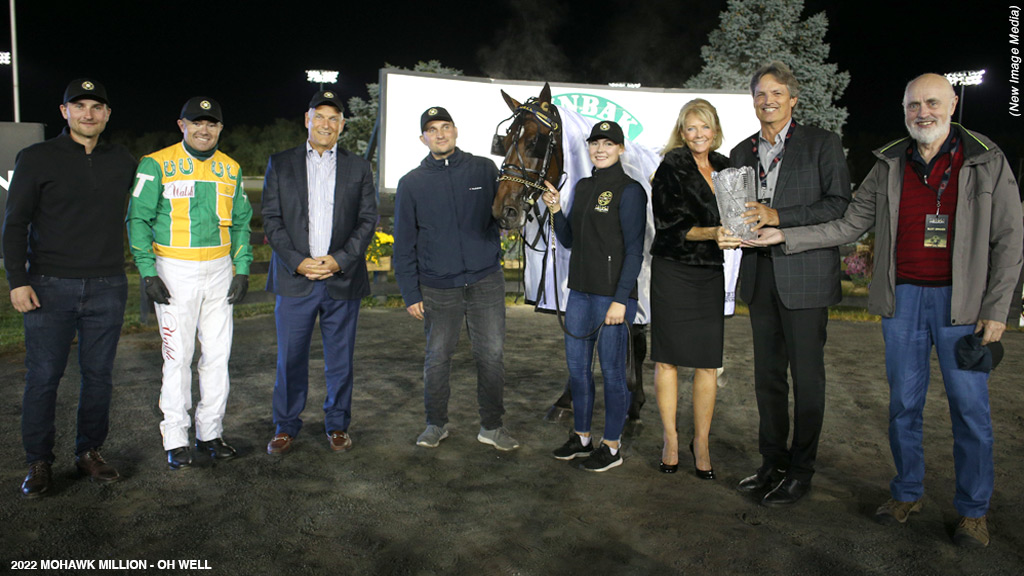
Stewart knew it would take more than just Melander to give the green light though, and he also knew the entries were needed by the Monday of the week of the race.
“So, it’s not always tough convincing the trainer, but then you have to speak with the owner,” Steve laughed. “On the Saturday morning, Marcus said the horse was doing well, but here we are, however, 48 hours out from entry day for The Million, and we still don’t necessarily have a horse. It’s three in the afternoon, and Marcus was going to reach out to the owner, in Sweden, to get his thoughts. On the Sunday morning we found out we were good-to-go.”
Teaming with owner S R F Stable, Hunterton and partners watched as Oh Well, eight days after his New Jersey triumph, recorded a 2 ½ length score, in 1:53.4, as the 3/5 choice, and made his way into the Mohawk Million winner’s circle.
After stickhandling a slew of obstacles in the weeks leading up to the race, Hunterton had its natural hat-trick in The Million.
Deciding to chase a fourth consecutive Million crown was never in doubt for the Stewarts.
“For the first two editions, the only thing we had to say was that we were the breeders, but after that, people were coming to the consignment and asking if we had any horses up for sale whose first three letters of their name were VEN.” Steve laughed.
So, after being associated with the winner once again in year three, chasing a fourth crown was an easy decision. Seeing it come to fruition however, would once again be a question mark.
“The next year, we didn’t have to ask our partners too much. We had won the race the year prior, and it was a 50/50 situation, where the connections put up the horse and we put up the slot.”
It’s easy to do the math on that one, and see that the profit for the slot owners was approximately $125,000. In 2023, in an attempt to achieve a similar feat financially, while also looking to pull off the four-peat, Stewart had his eye on a certain filly - a Tactical Landing miss that he had bred and sold with partner Atlantic Trot Inc.
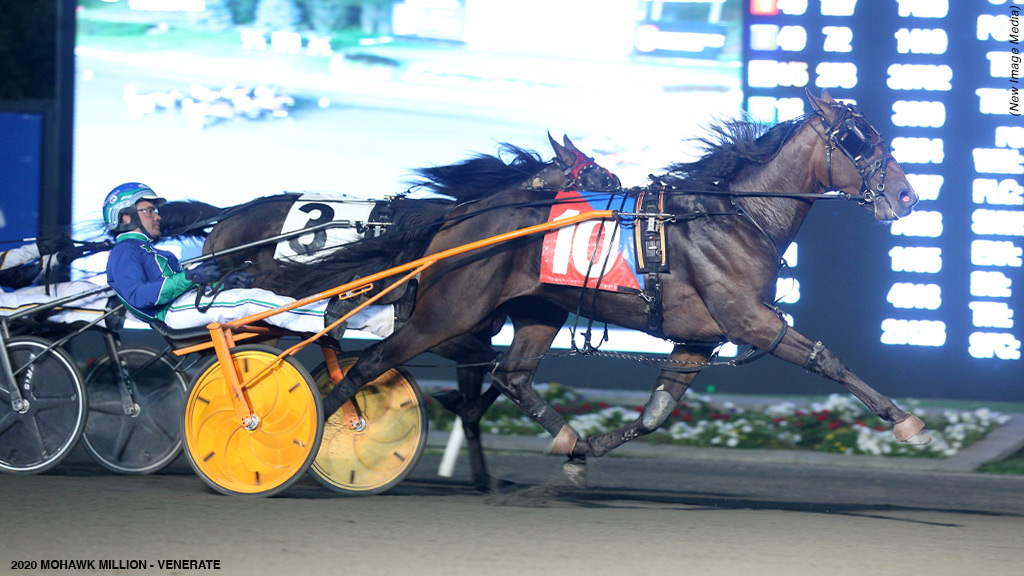
“Allegiant was racing, just like Venerate did, on the Sunday afternoon, and we had to enter for The Million on the Monday morning.”
This time however, the road to The Million took an unexpected detour.
“She had been racing well, and went off as the big favourite in the $400,000 Kentucky Sires Stakes final, but she didn’t do well that day - she finished fourth,” recalled Stewart.
“So, then it turns into, ‘If she is sick, what are we going to do now?’ We have about 15 hours to come up with a horse. This is not good. I had plenty of visions of calling Mohawk and telling them we don’t have a horse. When she didn’t race well, we spoke with Mr. Smith, her owner. We sold him the horse, so we knew her well, but not Mr. Smith. He told us that her bloodwork was bad, and that was why she didn’t race well, but he was confident they would give her the utmost care, and she would get well. They still wanted to go, but only if the horse was 100 per cent healthy.”
Steve was forced to come up with a backup plan.
“We thought we would have to go and find someone else. We started calling other people. There was a colt who had won two [OSS] Gold finals at Mohawk, but the owners didn’t want to go because it wasn’t in the schedule for their horse. That’s one of the challenges of this race - just because a horse is racing well, maybe their schedule isn’t right.
“We went to bed that night, and the next day Mr. Smith said the filly had been cleared to race. They stabled in Cleveland - that’s where she went after the Red Mile - so it wasn’t even a big ship to Mohawk.”
With one hurdle cleared, Hunterton faced another, specifically, nine capable rivals, including the formidable T C I, ready to take on their filly under the Woodbine Mohawk Park lights.
“The wings fold, T C I breaks and Determination’s horse [Drawn Impression] makes a break as well. We’re sitting third going down the backstretch, behind Top Mast, a horse we also bred. Scotty (Zeron), who was driving Allegiant, didn’t pull going to the half. He said he wishes he had. We ended up finishing third after T C I rebounded and still won the race.”
It might have ended the Hunterton winning streak in The Million, but not its support for the event.
In 2024, The Mohawk Million underwent changes: slot prices were halved from $100,000 to $50,000, and all 10 slots were made available for purchase, eliminating the free entry previously awarded to the William Wellwood winner.
The race continued to offer a $1 million purse, now with $500,000 in added money.
“I know it was tough for Mohawk to find people who would put up $100,000 for a slot that early [February 15th],” said Stewart. “When they lowered the slot purchase to $50,000 though, one year ago, they had more than enough people wanting to buy slots.”
Interest definitely skyrocketed, as 21 applicants entered a lottery for the 10 available slots.
Hunterton, in poker parlance, would hold a winning hand - and not just when their name was drawn as one of the lottery winners either.
This time, the Stewarts would hit the Mohawk Million motherlode with Maryland, a bay son of Chapter Seven out of the Father Patrick mare Crucial.
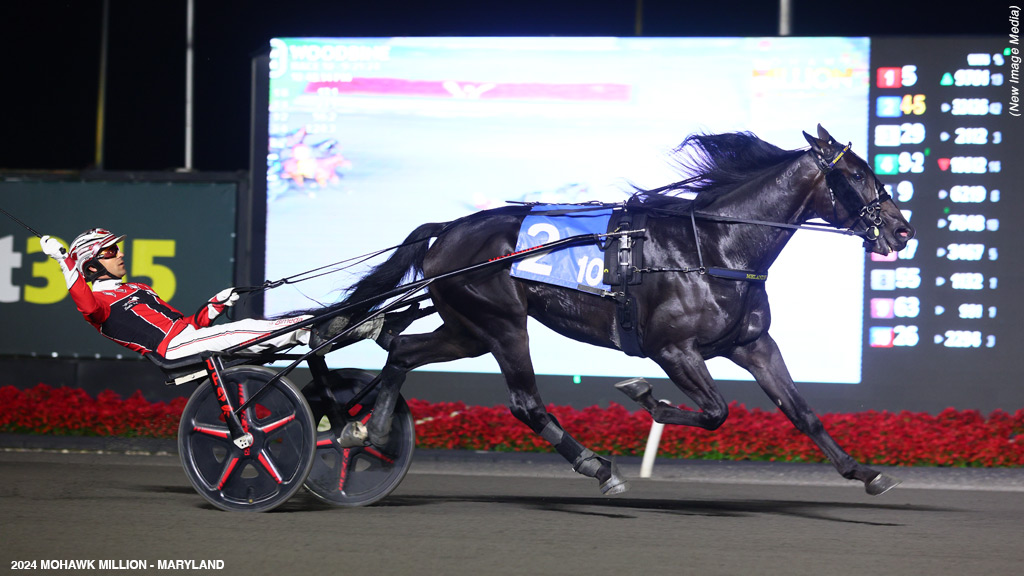
“Anders Strom of Courant bought him for $475,000 (USD) in 2023 at Lexington,” Steve said.
“He told us that we were taking 10 per cent,” Cindy Stewart laughed. “We’ve always been good at breeding horses,” she said, “but before Maryland we had never been very good at owning them.”
“When I wrote the cheque I basically considered it to be $47,500 that was gone,” smiled Steve. “Like Cindy said, for some reason our luck as owners had never been that good.”
They couldn’t have been more wrong in that assessment - something that doesn’t bother the likeable couple one bit.
Coming into the race with the seven-figure purse off of wins in the $575,000 Wellwood and the $527,027 Peter Haughton Memorial, and with Dexter Dunn at the controls for Marcus Melander, Maryland put on a Mohawk Million masterclass - a dominant 3 ½ length score in 1:52.3.
“Last year [2024] was easy [to choose a starter] because it was Maryland, who we own part of,” said Stewart. “That was the perfect situation. We had a slot; we won 10 per cent on the owner’s share and we made our percentage on the slot share also. That was fantastic.”
The sixth edition of the race however, would yet again present obstacles for Hunterton Farm to overcome.
For the 2025 edition, a record 37 applicants entered the slot draw. Hunterton, again, was among the lucky ten.
They would also need good fortune with their entrant, Apex, a son of Walner out of the Muscle Hill mare Mission Brief. Stewart, a co-breeder on both Mission Brief and Apex, is also a co-owner on the royally-bred colt that went through the Harrisburg sales ring for $525,000 in November of 2024.
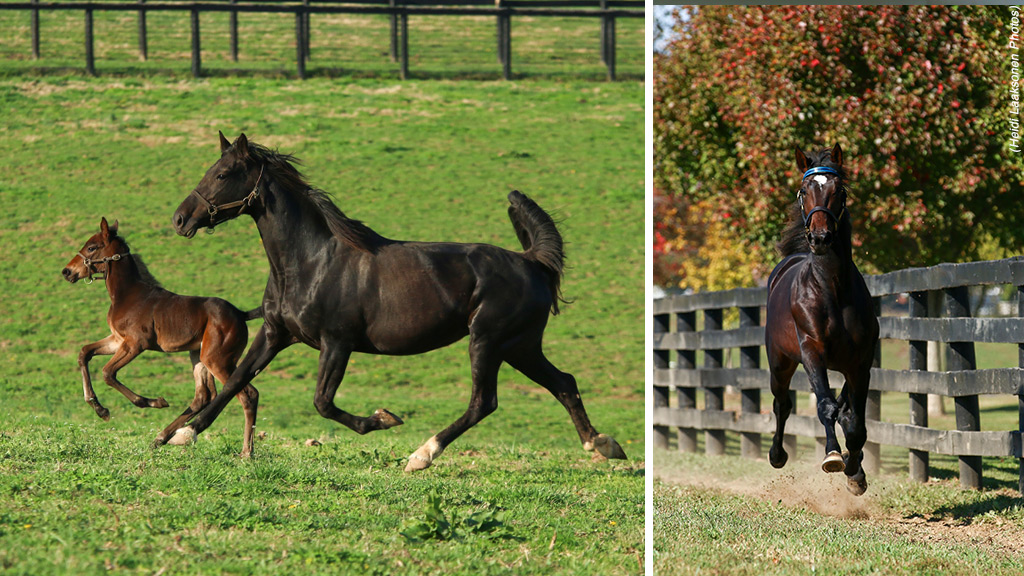
“This year, there was a lot of drama. I finally got a call on the Sunday afternoon from Marcus [Melander] saying that we were going to go. There was a lot of decision making there, though, because Apex had just raced three straight weekends. It was a question of whether or not we wanted to race him four straight weekends. Dexter (driver, Dunn), said the horse came out great from his previous race, but Marcus just needed a little more support for the decision.
“I had convinced myself that he wasn’t going, and thought we were back in familiar territory, where we would have to start searching for another horse at the last minute.”
This time, however, Stewart would not have to pick up the phone.
The sixth edition of the race, held on September 20th of this year, boasted the deepest field The Mohawk Million had ever seen - and the battle of the two-year-old trotters didn’t disappoint.
Apex prevailed off of a first-over journey, in 1:51.4, a stakes, track and Canadian record, in a race that was twice-as-nice for Stewart, who also co-bred the runner-up, Endurance (along with Martti Ala-Seppala).
The race itself was part of a record evening, one that generated an event record all-sources handle of $4,662,789, surpassing the previous record of $3.9 million set in 2022.
“Just unbelievable,” said Stewart. “It’s hard to wrap your head around it all.”
There are now four months before the slot owners for the 2026 Mohawk Million will be drawn. Stewart is obviously hopeful to be part of the race once more.
“This year, we bred and owned the horse who won, and bred the horse who finished second. I don’t know what to do for an encore next year. I don’t know. Maybe it will be with one of the horses we sold at the sales? Maybe the plan will be to own more than 10 per cent. We’ll put in for another slot, hope to win the lottery, and hopefully, be back there again. We sure will try.”
Should they continue their streak of luck in this race, with a little serendipity and help from the racing gods, Stewart knows just what to expect in the leadup to the big night.
“Like I said with Oh Well, it’s not for the faint of heart. You need to have connections to find horses. I have watched people scramble ahead of the race. You just never know what can happen. You can never assume anything, and it can be challenging and concerning when time is ticking before the entry box closes.”
But for Hunterton, which sold over $12 million in yearlings at the 2025 Lexington Selected Sale (second-highest in auction history), success is defined by more than dollar figures.
“Because it’s The Mohawk Million, it is one of the sport’s most special and most sought-after trophies,” said Stewart. “It is not that you buy a slot and automatically have a horse in the race. It’s the connections that make it possible. It takes a village to win The Mohawk Million.
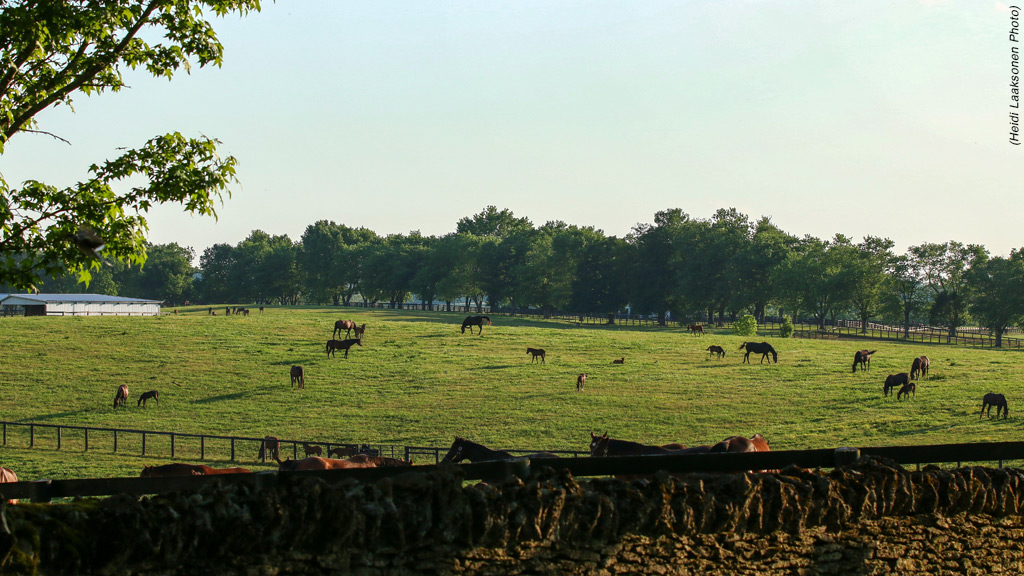
That village includes partners John Schmucker, Black Creek Farm, Elmer Miller, Hickory Hollow Stables, George Lowenfeld, Andrea Lea Racing Stables, Aron Schmucker, Maumee River Stables and Lester Graber.
“Every year with this race, we have wonderful partners who put up money for the slot. They are great people, who all love this race and the sport itself.”
Just like Hunterton Farm does.
“It isn’t the money that makes our record in The Million special, it’s the people we partner with and the notoriety the farm gets from the connection to its success in the race. That’s the icing on the cake. The fun part and the reward are being associated with horses we have either bred or owned.”
That philosophy made their participation in the Mohawk Million feel like a natural extension of their mission.
An event that rewards long-term vision, strategic partnerships, and a deep commitment to the future of harness racing is what Hunterton has always stood for.
“It’s very nice to work with our partners, to see it all come together. I also think Mohawk does such a great job promoting the sport. They don’t have to do this. They don’t have to put up the money and effort, but they do. Hats off to them. It’s so much fun to be associated with such a great group of people. They do such a good job making the owners and the connections feel special.”
This feature originally appeared in the November issue of TROT Magazine. Subscribe to TROT today by clicking the banner below.


